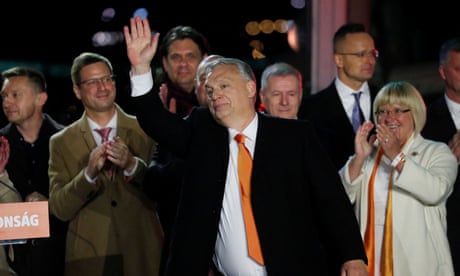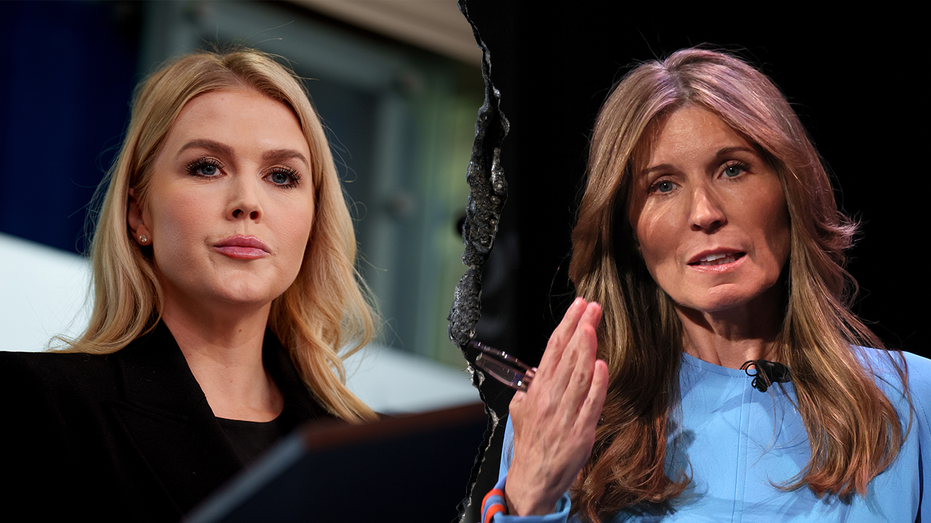- by foxnews
- 06 Mar 2025
Viktor Orbán declares victory in Hungarian general election
Viktor Orbán declares victory in Hungarian general election
- by theguardian
- 04 Apr 2022
- in news

"We won a victory so big that you can see it from the moon, and you can certainly see it from Brussels," he said.
Preliminary results showed Fidesz controlling 135 seats in the 199-member parliament, while the united opposition alliance had 57 seats with over 80% of votes counted.
That would allow Fidesz to retain its two-thirds supermajority that has enabled it to radically restructure the country's politics and social policies during its 12-year reign, transforming Hungary into a self-styled "illiberal democracy" that has flouted western norms and frequently been at odds with the EU.
Defeat had been anticipated but by a less crushing margin. A pro-opposition MEP, Marton Gyongyosi, from the former far-right Jobbik party - now rebranded as a mainstream centre-right grouping - said Hungary now faced further international isolation, with even its erstwhile ally, Poland's ruling nationalist Law and Justice party, now abandoning Budapest over the war in Ukraine.
"Hungary's situation wasn't easy even before, and as an MEP I can see that clearly that Hungary is completely isolated," he said.
The opposition has also complained that Fidesz has a huge advantage in election spending and communication. It said it had about 2,000 election advertising billboards throughout the country to 20,000 for the governing party.
Even before polls closed, opponents called attention to possible voter fraud - the possibility of which prompted the Organisation for Security and Cooperation in Europe (OSCE) to dispatch a 200-strong team of election observers.
The OSCE's office for democratic institutions and human rights has criticised what it said was blatant gerrymandering in several constituencies. Analysts predicted that gerrymandering would mean United for Hungary needed to win about 5% more of the popular vote than Fidesz to stand a chance of gaining a parliamentary majority.
The Clean Vote Coalition - a grouping of four Hungarian NGOs - said it had received numerous complaints of irregularities. They included electors being offered 10,000 Hungarian forints (�23) for their vote and, in another location, meat being on offer as an inducement. There were also reports of illegal bussing of voters.
Fears of fraud had been fuelled before polling day after a large number of election ballots - most of them said to be for opposition candidates - were reportedly found partly burned in a sack at a landfill site last week in the Romanian region of Transylvania, where many ethnic Hungarians have dual citizenship and voting rights.
Fidesz's victory came after high voter turnout - a factor experts assessed would help the governing party - despite frigid temperatures and wintery weather.
He has also refused to allow the supply of weapons to Ukraine or permit military aid to pass through Hungarian territory, angering Nato allies and the Ukrainian president, Volodymyr Zelenskiy, who has branded him Putin's sole European supporter.
He said reducing energy dependency on Russia - which provides an estimated 90% of its gas and 65% of its oil - would wreck Hungary's economy.
At the same time, he cast Marki-Zay's opposition bloc, which has called for closer cooperation with the EU and Nato, as "warmongers" who strove to send weapons and Hungarian troops to Ukraine.
However, Daniel Hegedus, a Hungarian analyst with the German Marshall Fund, played down such expectations.
"There may be some realignment towards the west, but in general what he is seeking is a return to business as usual with Russia - both in terms of energy cooperation and economic cooperation," he said.
- by foxnews
- descember 09, 2016
'Gate lice' run-ins have flyers demanding more airlines 'crack down' on pesky travel trend
Passengers are asking major airlines to do something about "gate lice" problem at airports. American Airlines currently has new tech to stop the line-cutters.
read more


